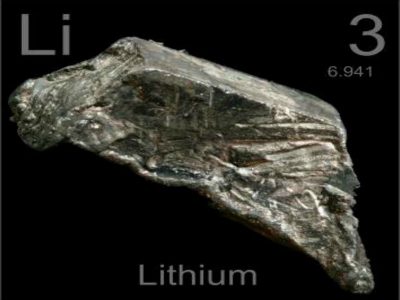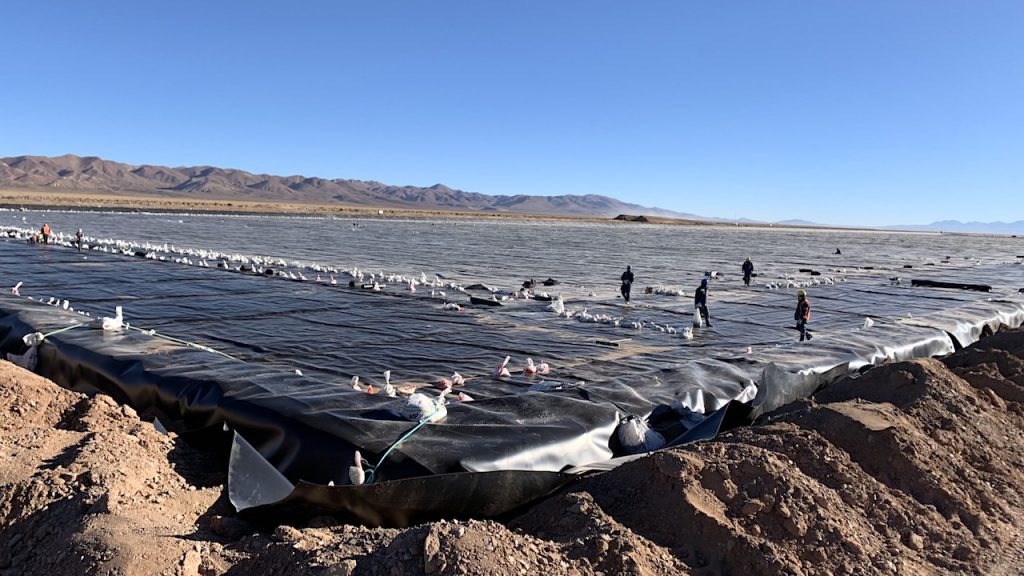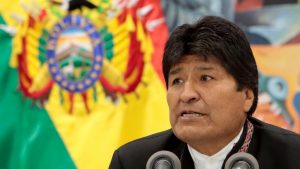The Tyranny of Lithium Extraction in Argentina

In the middle of a raging Covid-19 pandemic, Argentina has decided to accelerate the lithium mining sector. This intensification is occurring as a part of the larger expansion of Argentinean extractivism wherein the country has decided to triple its mining exports to over US$10.7bn per year in the next decade.
For this, apart from copper, the government also mapped 15 new lithium projects. Preparations for managing and augmenting the developing lithium sector have commenced with the establishment of an association named Calbafina, tasked with organizationally buttressing the lithium sector.
The current economic expansion of the Argentinean lithium sector is occurring for two reasons. Firstly, despite the Covid-19 pandemic, the demand for lithium is set to increase and while “There has been a slowdown in capital commitments…the outlook for growth in lithium demand suggests it has merely been delayed but not derailed, and Argentina will play a key role in supplying global requirements.” EV sales are forecasted to grow from 2 million in 2019 to 26 million by 2030 and Orocobre, an Australian company operating in Salar de Olaroz, Argentina, says that the European demand for EVs will increase markedly and the lithium-ion battery manufacturing capacity will grow five-fold by 2029.
Secondly, Argentina is the most attractive destination for lithium investors and presents a suitable investment climate for mining projects. For the lithium bourgeoisie, the main outlet for surplus-seeking investible capital is the “Lithium Triangle” which has 70% of the world’s lithium brine deposits. This region is constituted by northern Chile, northern Argentina and Southern Bolivia. Chile and Bolivia are, therefore, the main competitors for Argentina. In comparison to Argentina, both these countries are either afflicted by the under-dose of free market fundamentalism or are experiencing cataclysmic political events.
In Chile, the deficiency of proper trade liberalization is the major impediment preventing the country from becoming the leading lithium destination. Through Decree Law 2,886 of 1979 and Organic Law of Mining Concessions of 1983, Chile instituted several regulatory reforms in the lithium sector: lithium was declared as a strategic resource because of its use in nuclear fission; the prior authorization of the Chilean Nuclear Energy Commission was made a vital component of lithium mining procedures and private miners were required to either partner with the state or obtain a special permit called Special Lithium Operation Contracts (CEOL) to mine on their own.
In contrast to Chile, Argentina has a non-interventionist regulatory regime extremely favorable towards the extractive capitalists. In the 1990s, for example, amendments were made to the Mining Code which financially supported the rampage of extractive capital through the granting of import duty benefits for mining equipments, total tax burden stability for 30 years and income tax benefits for mining companies. These mining reforms were further sweetened by the former president Mauricio Macri who “signed a new mining deal to harmonize taxes and regulations in 20 provinces with the aim of attracting mining investment…Macri removed currency and capital controls and reversed taxes that were introduced by the former presidents. After signing the new mining deal, approximately 40 foreign companies showed interest in Argentina’s mining industry. More than half of those companies are interested in lithium”. In addition to actively implemented policies, Argentina’s mining governance structure imperceptibly supports extractive capital through unaccountably amorphous laws. The National Argentinean environment law, for instance, states that any activity capable of modifying the environment “in a significant form” must be subject to an Environmental Impact Assessment (EIA). A large legal lacuna present in the text pertains to the absence of any clear-cut definition of what constitutes as a “significant modification”, thus allowing mining operations to unrestrainedly exploit a resource-rich region.
Bolivia’s lithium scenario is worse than Chile since here political instability and resource nationalism have combined to produce a highly unsteady situation of socio-cultural dissonance. Before the 2019 coup, Evo Morales governed Bolivia as a socialist president and used the resource revenue of the country to domestically redistribute wealth and reduce inequality. As a part of this redistributive project, Morales did not expose the large lithium reserves of Bolivia to predatory transnational corporations and instead, opted to utilize lithium as a modality for industrializing the country. In response to the socialist-protectionist policies of Evo Morales, a “Lithium Coup” occurred in 2019 whose aim was the radical re-configuration of lithium as a mere physical input for transnational corporations. Ever since the coup took place, Bolivia is experiencing increased political instability as pro-Morales protestors are being violently repressed and killed by the right-wing genocidal government of Jeanine Anez. Due to the current combination of political perilousness and strong sentiments of resource nationalism, Bolivia is a country least likely to attract lithium investors in the near future.
Political stability in Argentina is guaranteed by the present-day government of Alberto Fernandez which, like the administration of Nestor Kirchner, “envisions a new political party of the center-left based on a return to the national-popular politics of the earlier Peronist era, but with less corruption and repression.” Through left-leaning changes in foreign policy, a redistributive agenda comprising of wealth tax and subsidization of basic necessities such as food, Alberto Fernandez is likely to temporarily stabilize the Argentinean political territory. With this stabilization, lithium mining in the country will encounter de-intensified socio-ecological conflicts as the Fernandez government carefully pursues redistributive policies, de-radicalizes incipient anti-neoliberal protests through economic sops and uses the state apparatus to defuse class struggle. While the people affected by lithium operations are inevitably going to protest, they won’t be able to establish intra-subaltern solidarity as a generalized atmosphere of class collaborationism is installed and the multi-faceted section of the oppressed people is unable to institute macro-unity.
As the opening of the Argentinean lithium largesse to transnational corporations takes place, it is imperative that we recognize the unprecedented ecological damage, cultural loss and economic uncertainty which lithium mining brings to the indigenous people living in various resource-rich regions. In Argentina, lithium resources are found in numerous salt lakes located in three northern provinces: Catamarca, Salta and Jujuy. Within these provinces, Salar del Hombre Muerto, Cauchari, Olaroz and Salar del Rincon are the major producers of lithium. In the last few years, lithium production has been steadily increasing and from 2.5 thousand tons in 2013, Argentine lithium production has increased to 6,400 metric tons in 2019 and according to the Ministry of Mining, “investments in lithium extraction grew by 928% between 2015 and 2018.” The breakneck speed of lithium extraction in Argentina is indicated by the fact that “Between the mid-2000s and 2011, Salta’s government issued permits to 15 companies to extract lithium from brines in 13 salt flats. Salta’s fast and easy permitting process enabled a brine grab as officials prioritized attracting foreign investment”.
While Argentinean lithium output is increasing contemporaneously with the expansion of electric mobility in the Global North, deliberately obscured indigenous communities living in that country are being dispossessed and defrauded of their entire existence. The Olaroz lithium mining project, for example, operated by Sales de Jujuy, a joint venture of the Australian mining company Orocobre, the Japanese Toyota Tsusho Corporation, and Jujuy’s state-owned mining enterprise Jujuy Energía y Minería Sociedad del Estado (JEMSE), was marred by myriad informational irregularities: there were serious delays in the availability of information prior to indigenous assemblies; the mining companies used a highly technical jargon to communicate with the indigenous people and those who asked any questions about the presented reports were answered in a similarly incomprehensible manner; all the reports used by the indigenous people, from environmental issues to economic benefits, were wholly provided by the mining corporations, suggesting a serious lack of informational independence. As a result of this complete absence of informational independence, an individual affected by the mining operations of the company said that “I don’t know if what we get is what corresponds to us according to our rights over the land, how could one know that?” In another instance, a person said that “Regarding the water issue we only have the version from the company and nothing else…So, lately we have been looking for some professionals that could help us that are not related to the companies nor to the government – it is difficult, but well, we are looking”.
In the consultation process involving Minera Exar, another company which has been commercially mining the Olaroz-Cauchari salt flat, “The provincial government did not supervise dialogue between international companies and local communities. Nor did it comply with the requirement to provide basic information to help understand the environmental impacts of lithium mining in the area. This has negatively affected the communities’ ability to evaluate the project in question and/or to control their activities”.
Through the use of fraudulent procedural tactics, mining companies not only illegally steal indigenous land but also subvert a whole way of living. The environmental damage generated due to lithium mining causes traditional indigenous lives to get culturally cracked and economically destabilized. The depletion of water in the Argentinean salt deserts is one such example of lithium-caused environmental damage existentially eroding the indigenous people.
Marcelo Sticco, a hydrologist working for the University of Buenos Aires, while talking about the region where Kolla (a general name for Quechua and Aymara people) live, says (translated from Spanish) that
“The problem is that salt water and fresh water are in a fragile natural balance in this region. Due to the lithium production, the natural water level drops. And this causes the salt water to mix with the fresh water. This contamination is irreversible and the region is irrevocably losing its drinking water reserves.”
As per data provided by Provincial and National Mining Offices in Argentina, “no less than 5 and up to 50 m3 of fresh water are needed per ton of final battery grade Li2CO3 that is produced.” Furthermore, for the production of 17,500 tons of lithium carbonate per year, 240l/sec of salt brine is extracted.
With the large-scale disturbance of regional hydrological dynamics due to lithium mining, wetlands and lagoons, which rely mainly on subterranean waters, slowly disappear. These wetlands and lagoons are indispensable for the existence of flora and fauna and therefore, contribute to the sustenance of locally rooted agro-pastoral practices. But when lithium mining seriously subverts the fragile water balance of Argentina’s salt deserts, indigenous people lose their ability to engage in their traditional occupations. Apart from water scarcity, lithium mining in Argentina is also producing chemical wastes and “most of this waste is merely accumulated at the verge of the salar [salt flat], except for the Mg-Ca residues which are sometimes used to consolidate precarious roads within the mining facility. Briefly, total dissolved solids in brine are very high. When brine is evaporated, all salts other than lithium carbonate end up as waste.” According to a report produced by the Friends of the Earth Europe, “toxic chemicals are needed to process lithium. The release of such chemicals through leaching, spills or air emissions can harm communities, ecosystems and food production. Moreover, lithium extraction inevitably harms the soil and also causes air contamination.” Due to this chemical pollution, cattle are dying and since the initiation of lithium mining in Kolla regions, there have been the rapid deaths and deformed births of Llamas.

Lithium mines in Argentina
Despite the environmental catastrophe brought about by lithium mining, Carlos Oehler, president of the Jujuy Energy and Mining State Society, says that lithium is “an opportunity for development. And the people who only emphasise the environmental impact do so out of ignorance,”. Contrary to the Oehler’s disingenuous claims, Verónica Chávez, a member of a local cooperative engaged in traditional salt harvesting, asserts that “Lithium is food for today and hunger for tomorrow,”. This statement pithily encapsulates the fleeting economic benefits of mining and expresses the long-term ecological damage which lithium mining inflicts on the indigenous people. Like any other extractive activities, lithium mining too “is a temporary activity that tends to generate an economy that is mainly dependent on the sector. This dependence is a danger for the development of the regions attached to the mining operations because, although during the production of the mine they may experience an economic boom, they will not be able to replicate this when the mining activity concludes.” Moreover, the massive environmental vandalism done by lithium extraction does not in any justify the meager “development” which indigenous people receive.
Lithium projects in Argentina have not been completely frictionless and unantagonistic and various indigenous communities have been resisting the onslaught of the “global green economy”. In the town of Susques (located in the Jujuy province), which is situated within the area of influence of the Olaroz-Cauchari salt flat, the approximately 2500 people living there have been protesting for many years. In Susques, local communities and a peasant organization called Apacheta Collective claimthat Sales de Jujuy and Minera Exar (the companies operating in the Olaroz-Cauchari salt plains) coerced them into accepting the mining projects, consulted less than 20 people and thus, failed to meet the requirement of getting approval from more than 50% of the population. The Apacheta Collective, in particular, has been militant in its opposition to transnational extractive capital and has been combatively organizing to resist mining operations. As a natural result of its class combativeness, the Apacheta Collective has been facing threats and harassments and in 2012, one of its members had to be hospitalized after being brutally beaten for political activism.
The etymology of the word “Apacheta” beautifully illustrates that an alternative world to capitalism is possible. According to Carlos Guzman, representative of Apacheta collective, “An Apacheta is a pile of stones, placed on strategic locations, for example at the beginning of a road. An Apacheta grows, very slowly, but with a lot of meaning. When I start a journey and I see an Apacheta next to the road, I stop, place a stone on it, and wish that I will arrive safely at my destination. Everyone who will pass by will do the same. That is the same idea as our group. That is the meaning of our name. We start with just a couple of people, but we will grow. Very slowly, but with a lot of meaning.”
The Apacheta Collective, throughout its existence as a counter-hegemonic force, has maintained that the lithium mining companies recklessly ransack the environment and according to the head of Apacheta Collective, “we are suffering a drought”. True to the statements of Apacheta Collective, it is estimated that in the Olaroz-Cauchari extraction site, “more water was being lost through water evaporation ponds than was naturally replenishing into the system.”
Along with a strong anti-imperialist position, the Apacheta Collective also possesses an alternative imagination of world that is radically different from the “development” which lithium companies provide indigenous people with. Gonzalo, a member of Apacheta Collective, argues that “They [the companies] always say that we don’t want progress, that we don’t want development. For them, development is building roads, destructing nature, making money. For us, that is not development. It is not sustainable. Our grandparents, their grandparents and so on, have always taken care of Pachamama [mother earth], of nature, their lama’s, their sheep. We want to do the same. We use their wool to make our own clothes, we use their meat for our own consumption and what is left, we sell, or we trade. I want to transmit my animals to my children, so they can do the same. That is sustainable. But what will happen to us when there is no water left?”
The Salinas Grandes salt plain, the fourth biggest in the world, in the Jujuy and Salta province, is another region where indigenous communities have carved a bottom-up politics of mobilization. In 2010, “Salinas Grandes and Guayatayoc communities filed a collective injunction against the states of Jujuy and Salta and against the national government demanding respect for their right to consent to lithium exploitation.” In Kachi Yupi (Footprints in the Salt), the consultation protocol made by the indigenous communities affected by the lithium mining operations and one of the first of its kind, the indigenous people write that “nobody told us anything about how this new exploitation might affect our communities and our territory, the salt flats, the watersheds, the pastures, our livestock…our customs and beliefs. In synthesis: our whole life.”
The indigenous people affected by lithium operations in Salinas Grandes, formed by 33 indigenous communities such as Tres Pozos, Pozo Colorado, San Miguel del Colorado and Inti Killa de Tres Morros, soon established the Table of Original Peoples of the Salinas Grandes Basin and Guayatayoc Lagoon (La Mesa de Pueblos Originarios de la Cuenca de Salinas Grandes y Laguna de Guayatayoc). After filing a lawsuit before the Argentine Supreme Court of Justice in 2010 against the granting of extraction permits without prior consultation, La Mesa’s case was taken forward by the NGO Environment and Natural Resources Foundation (Fundación Ambiente y Recursos Naturales) in the form of Amicus Curiae briefs. When the case was dismissed in 2012, La Mesa, with the help of lawyers, took the case to the Inter-American Human Rights Commission.
Like the Olaroz-Cauchari salt plain, Salinas Grandes too is being destroyed by lithium extractivism and these socio-ecological problems have also been emphasized by the former Special Rapporteur to the Secretary General of the Office of the High Commissioner for Human Rights (OHCHR) on the Rights of Indigenous Peoples James Anaya who said that “it is feared that the proposed extraction of lithium will reduce the water level in this arid region, where water is needed to raise sheep, goats and llamas and is also essential to salt production and harvesting, an important activity within the traditional economy in the area.” A lawyer, while talking about prospecting companies in Salinas Grandes, said that “They [the companies] drilled the aquifer. And they committed a double wrong. They contaminated the aquifer from where [the communities] obtain water for animal husbandry and orchards. And, worse, the fresh water that rose to that part of the salt bank ruined the salt, so it cannot be cut and sold anymore.” In this way, ancestral occupational arrangements are being slowly undermined and in their place, an unsustainable model of development is being installed.
As the process of lithium intensification progresses in Argentina, the indigenous communities are slated to get embroiled in the subhuman suppression of transnational extractive capital. Even before the economic expansion of lithium mining, M. Mutuma Ruteree, UN Special Rapporteur on contemporary forms of racism, racial discrimination, xenophobia and related intolerance, had said that indigenous people in Argentina are “largely invisible in society and are excluded from the country’s senate, congress and judiciary”. Now, when the tentacles of lithium mining are being extended into the far-flung regions of Argentina, it is inevitable that indigenous people will be further dehumanized and existentially eviscerated. In order to present a creative counter-offensive against the “Lithium Leviathan”, we need to stop what has been labeled the “imperial mode of living”. Markus Wissen and Ulrich Brand, in their book “The Limits to Capitalist Nature”, write that the “Exclusive access to resources, guaranteed by contract or through open violence, and the externalization of the socio-ecological costs that using these resources entails, are the conditio sine qua non of the global North’s mode of living, which we therefore call ‘imperial’.” In the current conjuncture, we need to stop the engine of this “imperial mode of living” which is celebrating “electric freedom” in the Global North at the cost of the subjugation of indigenous communities in Argentina.
*
Note to readers: please click the share buttons above or below. Forward this article to your email lists. Crosspost on your blog site, internet forums. etc.
Yanis Iqbal is a student and freelance writer based in Aligarh, India and can be contacted at [email protected]. His articles have been published by numerous magazines and websites such as Monthly Review Online, ZNet, Institute of Latin American Studies, Green Social Thought, Weekly Worker, People’s World, LA Progressive, News and Letters Weekly, Economic and Political Weekly, Arena, Eurasia Review, Coventry University Press, Culture Matters, Dissident Voice, Countercurrents, Counterview, Hampton Institute, Ecuador Today, People’s Review, Eleventh Column, Karvaan India, Clarion India, OpEd News, The Iraq File and Portside.



